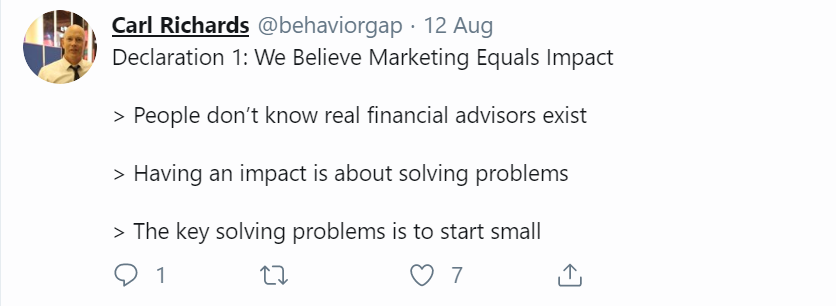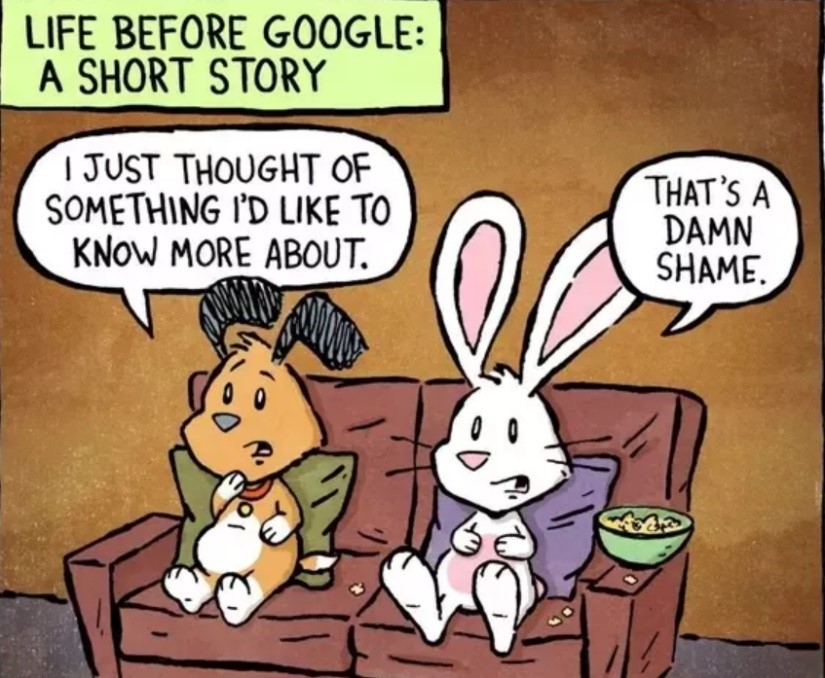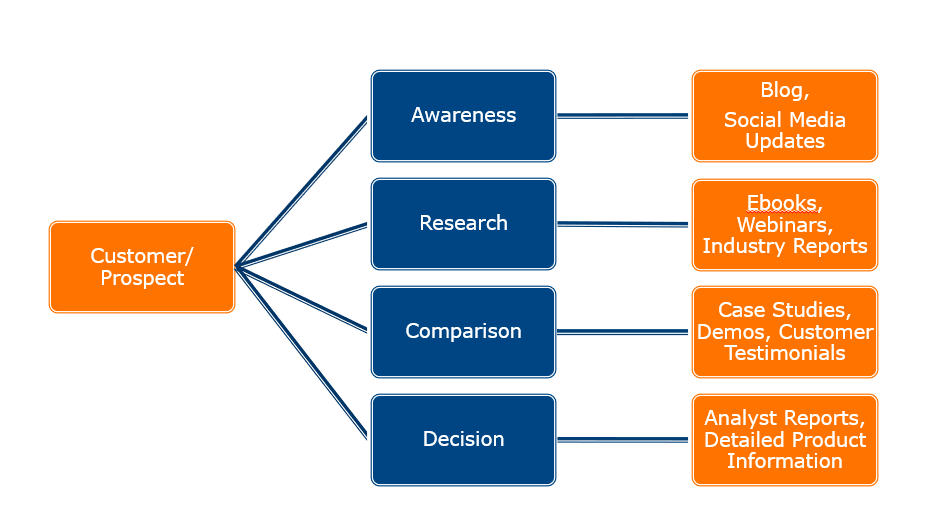Why Marketing Equals Impact
A few days, ago, I noticed this fascinating tweet by Carl Richards. If you don’t know Carl, he’s a financial planner and creator of Behavior Gap, where he makes complex financial concepts easy to understand.

As part of Carl’s manifesto, his first declaration was that ‘We Believe Marketing Equals Impact’. It got me thinking about how you create truly impactful marketing, and the impact that good marketing can have on your business.
As Carl says, ‘people don’t know that real financial advisors exist’. So, how do you use marketing to solve this problem?
You need a strategy
Think about how you deal with your clients. They come to you with a problem or challenge that they are facing. They may even have some idea of how to tackle it. However, by the time they leave you, they have a plan and will understand the importance of thinking more strategically.
It’s exactly the same for businesses with a marketing ‘problem’. Strategy will help you to:
- Understand your target markets so you know what you should be doing to market your business effectively (see more below)
- Understand your own business, so you know what your key USPs are and where you offer a point of difference. Once you’re clear on what your business does, it’s easy to explain it to others
- Set out your aims and objectives
- Measure the effectiveness of your current activity
- Focus on the right opportunities for your business, allowing you to target your resources at the right activity (this will save you time and money)
- Understand the ways in which you measure the effectiveness of your marketing strategy.
Know your target clients
Understanding who your target clients are is so important that I’m going to treat it separately here. If you don’t understand the people you are marketing to, how will you attract them?
As a start, build up some client personas which should include information such as:
- Age, gender, location, income and employment status
- A summary of the concerns and problems these clients have, and what might trigger their search for advice
- What you can do to help solve these problems and help the clients to achieve their goals
- How these clients make decisions, and what is important to them
- What clients’ objections to taking advice might be. Why would they elect not to take advice or choose another adviser?
You’ll probably know much of this information from your existing client base. If not, conduct a client survey or focus group to build up a clear idea of who you want to target.
Decide where to focus your marketing resources
Firstly, it’s important to remember here that your marketing resource isn’t just your spend in pounds and pence. It’s also your time in monitoring the effectiveness of your campaign and making changes as appropriate.
For example, getting active on social media might actually not cost you a penny in marketing spend. However, monitoring your account, following like-minded people, scouring the web for great content to share, writing your own blogs and newsletters, and creating enticing images to accompany your posts might take a fair bit of time!
Here’s another suggestion: improving your referral process could also help you to generate new leads and new business without you having to spend anything.
If you do have a marketing budget, heading online is a good place to start.
To do that, have a think about how a potential new client finds their way to you. Either they get your name from a friend or colleague or are referred to you. Their next step will probably be to type you into a search engine and see what the results show.
So, at the very minimum, you need to be visible online. Imagine, though, if you could create an amazing first impression. You’d appear high in the search results, with a fully completed Google profile that shows lots of positive reviews and links to your popular social media accounts.
When a potential customer clicks, they would then get to see your website which explains who you are, what you do and why they should choose you. Social proof such as testimonials, award wins and client videos can really help.
Of course, a potential client may be looking to solve a problem but may never have heard of you. That’s when your client personas are so important, as you can carefully target potential clients by gender, age, location, and search term using Facebook, LinkedIn and Google AdWords.
It’s about mapping the content to the customer journey:
Measure your success
Often, I hear clients talk about marketing to ‘build their brand’ or to ‘raise their profile’. In theory, these are perfectly laudable objectives – but how on earth will you know when you have met them?
If you’re going to implement a marketing strategy, you have got to have goals and you have to be able to measure them. Examples might be:
- 20 new downloads of your pension guide
- 10 completed contact/enquiry forms
- Increasing website traffic by 20%
- Reach 500 Twitter followers
- Increase the number of newsletter sign-ups by 75
Of course, knowing what you want to achieve also helps you to define your marketing plan. Improving your Search Engine Optimisation or using AdWords is likely to get more traffic to your website. Creating useful and shareable content on social media will help you attract more followers.
Whatever you do, make sure you measure it – otherwise, you’ll never know what has worked, and what hasn’t.
Getting your marketing right
In the past, I’ve looked at why it’s important that you understand the areas in which you add value, and delegate everything else.
According to a Cerulli Quantitative Update, financial advisers spend up to 41% of their time on admin and office management tasks. You will, no doubt, be responsible for tasks which aren’t in your main field of expertise, or that you don’t enjoy. Examples of such tasks include:
- Compliance
- Case reviews
- Training and competence
- Marketing
- Investment management
While all these tasks are crucial to your business, there might be people better placed to undertake them. That’s where we come in. We understand that you sometimes need to delegate your marketing to the experts, and that’s why we provide an outsourced solution for all the above.
Regards
Simon Goldthorpe
Executive Chairman, The Beaufort Group

